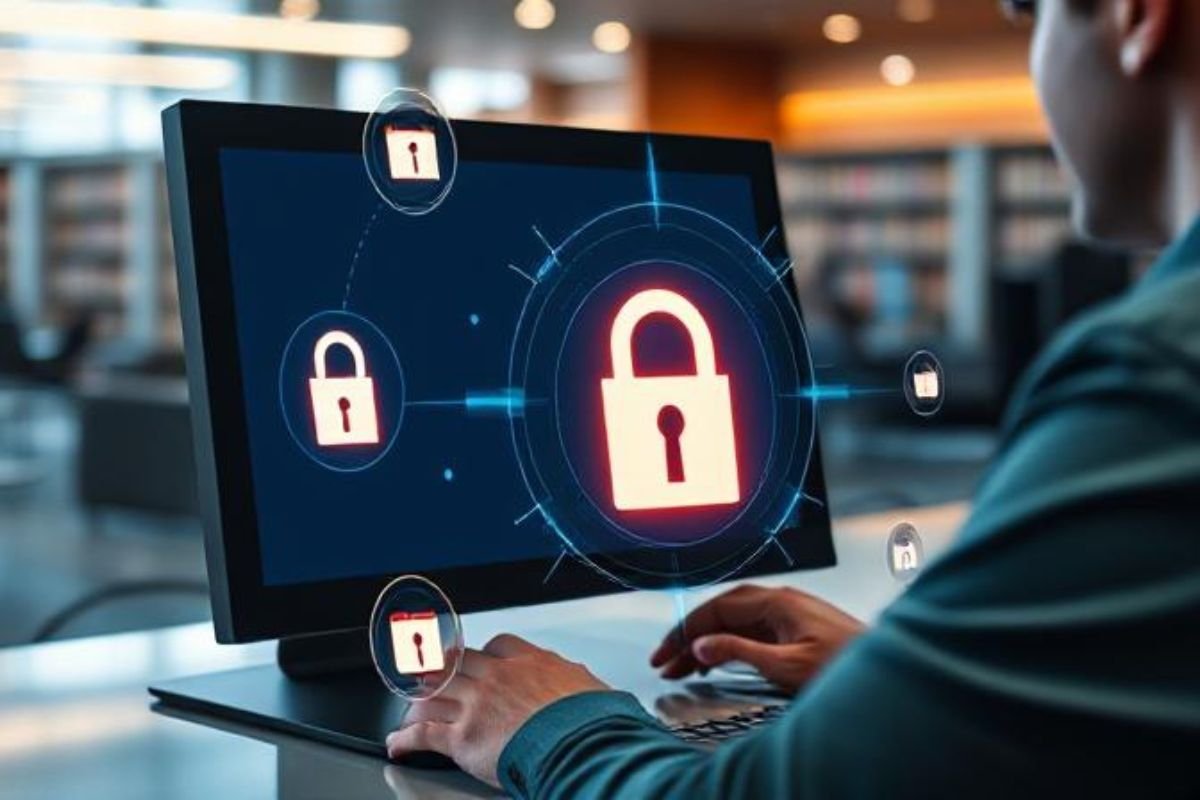We are all there – in the lounge, library, cybercafe, or hotel business center of an airport – when suddenly we need to check an email, download a document, or pay online. While public computers can be convenient, they are one of the riskiest ways to reach the Internet. Why? Because you do not control who has used it before you, whether software has been installed, or whether it has been compromised with malware.
General threats for your personal data
Danger comes from keyloggers that record everything you have written on phishing sites, including the passwords you typed in when tricked into revealing them. Your login details may be stored in the browser, or a person can also see them on your shoulder. Understanding these risks is the first step to protecting yourself.
Understand risks before logging in
Keyloggers and spyware
Many public computers can install keyloggers, quietly record every keystroke. This means that whatever you type – past, banking information, personal messages – can be stolen.
Browser history and saved credentials
Browsers often indicate to you to “save passwords” or “remember me”. On a public computer, it is dangerous because the next user can access your accounts.
Shoulder Surfing and Physical Security
Sometimes, the risk is as simple as someone standing behind you who tries to catch your login details. Always be conscious of your surroundings.
Best practice before using a public computer
Avoid sensitive activities
If possible, do not log in to the banking app, shop, or handle confidential work on public computers. Save these functions for a reliable device.
Use secret or private browsing mode
This prevents the browser from storing cookies, cache, and history. When you close the session, most of your activity scars disappear.
Check for installing security software
Before use, see updated antivirus or safety tools. If the computer sounds old or slow, it can be a red flag.
Smart login habits
Use two-factor authentication (2fa)
Even if someone captures your password, they do not gain access without another factor – usually a code sent to your phone.
Avoid saving passwords in browsers
Never click on “Remember me” on a public computer. Always enter the password manually and keep it safe.
Always log out properly
It is not enough to close the browser tab – work out of the accounts completely before leaving.
Protection of your personal files
Do not store the files locally
It is risky to save files on a public computer desktop or document folder. Anyone can open them later.
Use an encrypted USB drive if necessary
If you want to transfer files, use a password-protected or encrypted USB drive for additional safety.
Rely on cloud storage instead
To secure services like Google Drive or OneDrive, upload files and access them online. In this way, nothing is left behind the public machine.
Internet security on public computers
Avoid public Wi-Fi without VPN
Many public computers are associated with open Wi-Fi, which hackers like. Use a VPN to encrypt your connection.
See for fake login page and fishing
Always double-check the URL. Hackers often create a fake login page to steal your information.
Clean cash and cookies after use
Before leaving, remove browsing data manually. It removes saved sessions, cookies, and autofill data.
Using temporary safety measures
portable security apps
Take a portable antivirus or anti-malware scanner on your USB stick. A quick scan can help detect hazards.
On-screen keyboard for password
Typing passwords with an on-screen keyboard helps to avoid hardware keyboards.
One-Time Password (OTP)
Use disposable OTP whenever possible. For example, email logins often allow temporary codes sent to your phone.
After using a public computer
Clear browsing Data
Remove history, cash, cookies, and any downloads.
Cancel active sessions
Check your account settings (Google, Facebook, etc.) and sign out of other sessions from far away.
Change password if you suspect risk
If something is felt, “closed”, replace your password immediately with a safe device.
Long-term habits for protecting personal data
Use a password manager
A password manager produces strong, unique passwords and keeps them safe, so you don’t have to type them every time.
Keep backup copies of data
Cloud storage and external hard drives ensure that even if some compromise is made, your data is safe.
Trust your personal devices whenever possible
Best protection? Use your own smartphone or laptop whenever possible instead of a public computer.
Conclusion
Public computers are convenient, but they come with serious risks to your personal data. Using smart practices-like private browsing, two-factor authentication, encrypted storage, and VPN-you can reduce these dangers. However, the Golden Rule is simple: if it is sensitive, wait until you are on a reliable device.
FAQS
Is it safe to check my email on a public computer?
If you use 2FA and log out properly, it is generally safe, but avoid even if possible.
How do I know that a public computer is infected?
Indications include unusual lethargy, pop-up advertising, disabled antivirus, or unfamiliar software.
Can I safely shop online using a public computer?
Not recommended. Payment details may be stolen. Use your own equipment for financial transactions.
Should I use a VPN on public computers?
Yes. A VPN encrypts your traffic and adds a strong layer of security.
What is the safest way to transfer files on public devices?
Use an encrypted USB drive or cloud storage, and never leave locally stored files.
